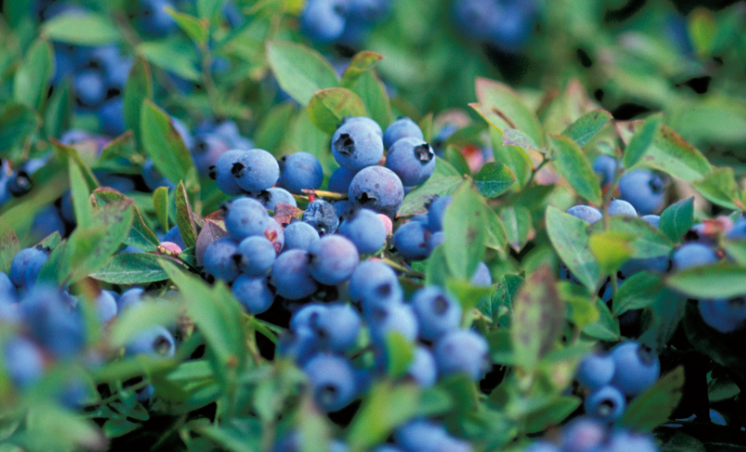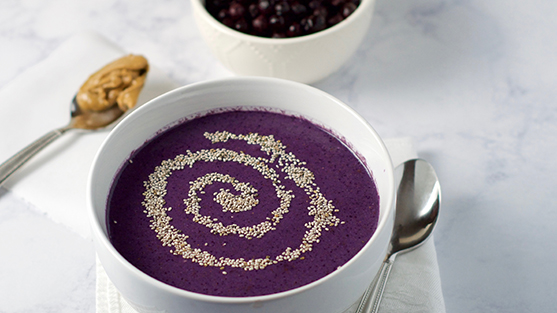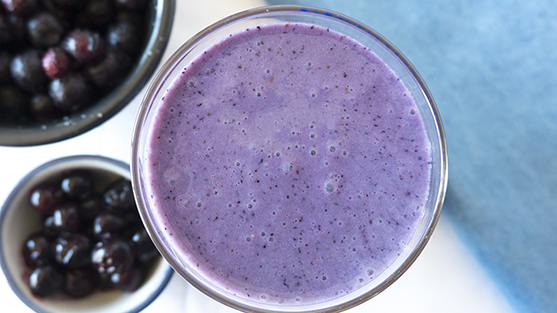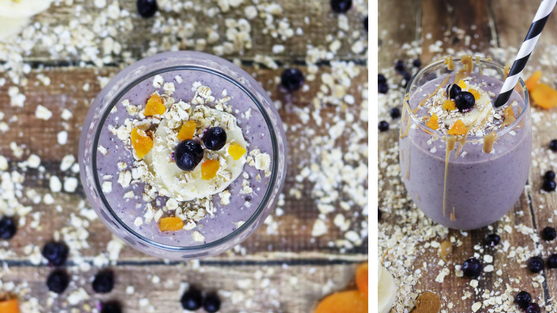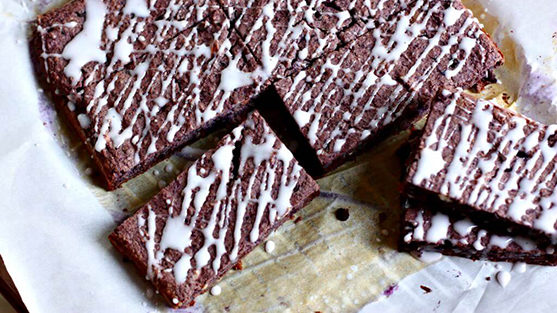Can Wild Blueberries Improve Your Teen’s Mental Health?
The teen years typically present some challenges for everyone in the family. Between hormones, their growing social lives and an increasing awareness of themselves and the wide world around them, adolescents have a lot on their minds!
How one handles stress, makes choices and relates to others are partly determined by mental health.1 And, while eating specific foods isn’t going to be the complete answer to mental issues, skills related to planning and managing a healthy diet can be part of your teen’s “toolbox” for mental health support.

What’s happening in my teen’s brain?
Adolescence, the period between ages 11 and 21, is a decade marked by important physical, social, emotional and cognitive changes. Brain development during adolescence affects both behavior and health.
You may have heard that the brains of adolescents are “under construction,” or not fully developed until the mid-20s (and yes, it’s true). One of the last brain regions to develop is the prefrontal cortex, located at the front of the brain . This area of the brain is responsible for things like planning ahead and impulse-control. The reward system of the brain also undergoes changes during adolescence that can impact behavior. Hence, it’s common for teenagers to increase sensation-seeking and risk-taking behaviors without considering the results of their behaviors.2
The adolescent brain is also very plastic, meaning it can adapt, change and respond to its environment. Being challenged academically at school and through creative activities helps the teen brain grow and develop, and thanks to the brain’s resilience, most adolescents go on to develop into mentally-healthy adults.3
However, according to the World Health Organization, half of all mental health disorders begin before age 14 (although most are not diagnosed or treated).4 In the United States, the young adult population (ages 18–25)—has the highest prevalence of mental illness (including mental, behavioral or emotional disorders of any severity) compared to other adults of any age.5
Two of the most common disorders in young adults are major depression and anxiety.6 Some scientists theorize that the way the adolescent brain responds to stress, (which is different than that of an adult brain) may contribute to the development of these two disorders in young people.3
What does diet have to do with mental health?
No matter what our age, our physical health and mental health are connected—and diet plays a role in both.
Our nutritional status is influenced by a variety of factors including our age and life-stage, our access to food and our environment. And these things, in turn, can influence our mental health.6 Altering our nutritional status to support mental health is possible (although “curing” mental health disorders through food is not). The field of nutritional psychiatry is centered around scientific, evidence-based manipulation of diet to address mental health issues.7
Mental health includes emotional, social and psychological well-being. If someone has mental health problems, it could be reflected in behavior, mood or thinking.1 And of course, at the center of all of this is the brain.
The brain’s basic needs for food
At the most basic level, the brain has just two food requirements: adequate quantity and good quality.
Adequate amounts of food
Anyone who has had an adolescent in the house knows that it seems like teens’ appetites can double overnight! It turns out that there’s a good reason why: both boys and girls in early adolescence require more food energy (i.e. calories) than at any other time in life.8 And for those teens involved in sports or other regular physical activities, calorie needs can be even higher.
A growling stomach can be a big distraction and make it more difficult to concentrate and be productive, but there can be more serious mental health consequences when young people don’t have enough food. In a study conducted with nearly 2,000 college-age students at one university, food insecurity was associated with a higher prevalence of self-reported depression and anxiety. In addition, the researchers found differences in food intake among the students who had depression and anxiety: depressed males had a lower fruit and vegetable intake (females did not), and both males and females with anxiety showed higher added sugar intake.6
Healthy, good-quality food
At the most basic level, the food we eat is the fuel for our brains. Feed it the good stuff (whole foods including fruits and vegetables that provide antioxidants, such as wild blueberries, along with fish, olive oil and whole grains, for example) and the brain will develop and function better. It will also be able to defend itself more effectively from the negative effects of oxidative stress. Antioxidant-rich fruits and vegetables, such as wild blueberries for example, help the brain fight oxidative stress (learn more about that here).
Wild Blueberries & your brain
On the flip-side, a diet filled with sugary drinks, sweets, highly refined grains, processed meats and high-fat foods typically provides plenty of calories, but little nutrition to support healthy body and brain function for anyone—let alone that of a growing adolescent. In fact, this type of diet (sometimes referred to as a “Western diet” prompts inflammation in the body and is also associated with increased risk of depression.9
The food & mood connection
Going from feeling hungry to being “hangry” seems like it’s all about how empty your stomach is, but there’s more to it than that. Our brains and the rest of our bodies “talk” to each other using natural chemicals that communicate through the nervous system, called neurotransmitters.
One of these neurotransmitters, called serotonin, helps stabilize mood and enhance feelings of well-being. It also is involved with regulating sleep, anxiety and appetite, among other roles.
Dopamine is a transmitter that influences mood and motivation via the brain’s reward system, helping us remember specific things about behaviors that make us feel good, so we can repeat them. Dopamine is also involved with decision-making, attention and working memory.10 (Learn more about how wild blueberries may impact memory).
Do Wild Blueberries improve Memory?
Certain foods may enhance body levels of neurotransmitters. For example, dopamine is made from the amino acid called tyrosine, so proteins that contain this amino acid such as eggs, cheese and soy-based foods can help increase the body’s dopamine supply.11
Does eating wild blueberries impact mood in teenagers?
A 2017 study conducted by researchers at the University of Reading in the UK was the first fully controlled, double-blind trial to investigate the effects of consuming wild blueberries on short-term mood in young people.
This preliminary study was actually conducted with two groups: some adolescents aged 18-21 and some children, aged 7-10. In both studies, participants were asked to rate their mood on a numbered scale both prior to and two hours after consumption of a wild blueberry beverage (or placebo). In both groups, participants recorded a significant increase in positive mood after drinking the wild blueberry drink. 12
A second study by the same research group, published in the British Journal of Nutrition in 2020, investigated the effects of daily wild blueberry or placebo beverages on teens’ transient and chronic moods and anxiety symptoms over a period of 4 weeks.
At the conclusion of the study, the participants who got the wild blueberry drink reported significantly lower scores on the measure of depression symptoms than those who were randomized to the placebo group.13
Create a lifestyle that supports mental health
There is no doubt that lifestyle habits are associated with mental health.13 Making sure your adolescent’s physical needs are met can go a long way toward helping support their mental health. According to the American Academy of Pediatrics, diet, sleep, exercise and social connection are the basics for mental health.14
This doesn’t have to be complicated! Here are some simple ideas for providing these basics at home:
Move every day
Exercise enhances blood flow to the brain and can help your teen sleep better.
- Be active with your teen when possible—exercise is good for everybody! Take the dog along on a family walk or hike, shoot hoops after dinner, or hit the gym together on the weekends.
- Be a good fitness role model—children and teens who have seen you taking care of your own fitness on a regular basis will consider an exercise habit normal self-care behavior, and be more likely to follow suit.
Sleep well
Healthy brains and bodies need adequate sleep, and a lack of sleep can increase irritability and moodiness as well as make it hard to concentrate. Adolescents need more sleep than adults—about 9-10 hours. You may have noticed that your teen wants to stay up later and sleep later than they used to. That’s due to the natural shifting of melatonin (the “sleep hormone”) levels in the body during adolescence, so when possible, consider giving a little leeway on what time he or she heads to bed and wakes up.3
Discuss good “sleep hygiene” with your teen, and demonstrate it yourself.
- Get off computer and phone screens an hour before bedtime (read instead!)
- Keep bedrooms dark and the house cool at night to encourage better sleep
Select brain-healthy foods
Increased appetite, combined with more opportunities to obtain food outside of the home can lead your teen to some eating habits that might not be serving the needs of the body and brain very well. You can encourage healthy dietary choices by:
- Keeping tasty and convenient choices, such as frozen wild blueberries, on hand for meal prep and snacking. Research suggests that the brain benefits from consuming wild blueberries span all ages. (Check out the recipe ideas below, or explore the large collection of wild blueberry recipes here!)
- Eating a meal with your teen at least once a day on most days of the week—it’s an opportunity for connection, and you’ll also be assured that he or she will get at least one balanced, wholesome meal daily.
- Teaching your teen some favorite family recipes, let them cook a dish or entire meal for the family on their own, or take a cooking class together online. Lots of teens enjoy cooking—and it’s a skill that will certainly come in handy when they leave home!
Keep it social
Meaningful relationships are important for overall health, and social interactions and conversations with friends are stimulating to our brains. Common interests and social acceptance are crucial aspects of teen relationships, and learning how to build these kinds of relationships requires social time.15
- Encourage your teen to spend an appropriate amount of time with friends and family—even if digital technology is involved sometimes.
- Express interest in your teen’s friends and social life, but don’t overdo it—independence is important.
References:
- US Dept. of Health and Human Services (2020). What is Mental Health? https://www.mentalhealth.gov/basics/what-is-mental-health
- Alderman, E.M., Breuner, C. C. Breuner and Committee of Adolescence (2019). Unique needs of the adolescent. Pediatrics December 144 (6) e20193150; DOI: https://doi.org/10.1542/peds.2019-3150
- National Institute of Mental Health (2020). The teen brain: 7 Things you need to know. https://www.nimh.nih.gov/health/publications/the-teen-brain-7-things-to-know/?utm_source=NIMHwebsite&utm_medium=Portal&utm_campaign=shareNIMH
- World Health Organization (2020). Adolescent mental health. https://www.who.int/news-room/fact-sheets/detail/adolescent-mental-health
- National Institute of Mental Health (2016). Mental illness. https://www.nimh.nih.gov/health/statistics/mental-illness.shtml
- Wattick, R.A., Hagedorn, R.L., Olfert, M.D. (2018). Relationship between diet and mental health in a young adult Appalachian college population. Nutrients 10(8) 957. https://www.mdpi.com/2072-6643/10/8/957/htm#B3-nutrients-10-00957
- Jacka FN. Nutritional Psychiatry: Where to Next?. EBioMedicine. 2017;17:24-29. doi:10.1016/j.ebiom.2017.02.020
- American Academy of Pediatrics (2016). A teenager’s nutritional needs. https://www.healthychildren.org/English/ages-stages/teen/nutrition/Pages/A-Teenagers-Nutritional-Needs.aspx
- Ljungberg T, Bondza E, Lethin C. Evidence of the Importance of Dietary Habits Regarding Depressive Symptoms and Depression. Int J Environ Res Public Health. 2020;17(5):1616. doi:10.3390/ijerph17051616
- WebMD (2019). Dopamine: What it is and What it Does. https://www.webmd.com/mental-health/what-is-dopamine#:~:text=Dopamine%20is%20a%20type%20of,in%20how%20we%20feel%20pleasure.
- Fernstrom, J.D., Fernstrom, M.H. (2007). Tyrosine, phenylalanine, and catecholamine synthesis and brain function. Journal of Nutrition 137 (6 Suppl 1): 1539S-1547S https://pubmed.ncbi.nlm.nih.gov/17513421/
- Khalid, S., Barfoot, K.L., May, G., Lamport, D., Reynolds, S.A., Williams, C.M. (2017). Effects of acute blueberry flavonoids on mood in children and young adults. Nutrients 9(2) 158 https://www.mdpi.com/2072-6643/9/2/158
- Fisk, J., Khalid, S., Reynolds, S., & Williams, C. (2020). Effect of 4 weeks daily wild blueberry supplementation on symptoms of depression in adolescents. British Journal of Nutrition, 124(2), 181-188. https://www.cambridge.org/core/journals/british-journal-of-nutrition/article/abs/effect-of-4-weeks-daily-wild-blueberry-supplementation-on-symptoms-of-depression-in-adolescents/E8ED12AC48E936A4A8D6664B93AD6AA6
- American Academy of Pediatrics (2018). Adolescent depression: What parents can do to help. https://www.healthychildren.org/English/health-issues/conditions/emotional-problems/Pages/Childhood-Depression-What-Parents-Can-Do-To-Help.aspx
- University of Kentucky Cooperative Extension Service (2017) https://fcs-hes.ca.uky.edu/sites/fcs-hes.ca.uky.edu/files/understanding_the_adolescent_brain_working.pdf
Get Great Recipes & More Each Month!
Sign up for occasional emails with recipes, health and nutrition tips, and more.

More About Brain Health
Blu-Flow study spotlights wild blueberries’ support of cardiovascular and cognitive function
New Research Study Indicates Wild Blueberries Improve Brain’s Processing Speed
A Healthy Heart Month “Two-fer” From Wild Blueberries
The Seven Wild Ways to a Healthy Brain in 2024
The Wild Difference: Celebrating Wild Foods Day All Month Long
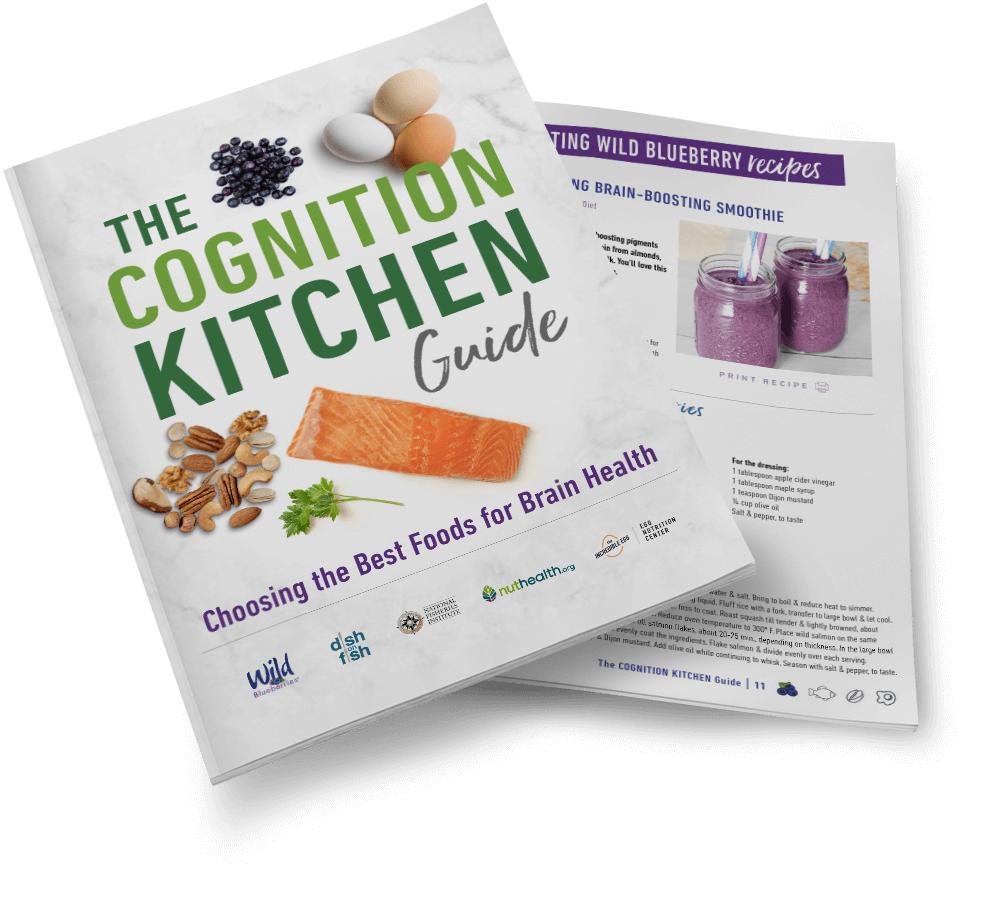
DOWNLOAD THE COGNITION KITCHEN GUIDE
A free resource to help you and your family start eating for brain health today. Find recipes, a grocery list, easy-to-understand health research, and more.

